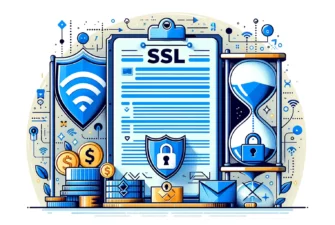
While many are familiar with conventional SSL certificates, the SAN certificate stands out as a strong solution for multi-domain security.
Wondering what is a SAN certificate and how one certificate can provide protection for several domains? We’ll explore the details of SAN certificates, breaking down their functions, advantages, and importance in the current digital landscape.
Table of Contents
- What Is a SAN Certificate?
- Difference Between a Regular SSL Certificate and a SAN Certificate?
- Are SAN and Multi-Domain Certificates the Same?
- Benefits of Using SAN SSL Certificates
- SAN Certificates Common Use Cases
- Most Popular SAN Certificates
What Is a SAN Certificate?
A Subject Alternative Name (SAN) SSL certificate, is a type of SSL certificate that allows users to secure multiple domain names with a single certificate.
Instead of purchasing individual SSL certificates for each domain name, the SAN certificate provides an efficient method by incorporating the names into the subject alternative name field of a single SSL certificate.
This ensures that your domains are secure and visitors will see the familiar padlock symbol in the address bar, indicating a secure connection.
Difference Between a Regular SSL Certificate and a SAN Certificate
A standard SSL certificate is typically issued for a single domain name and covers that specific domain. For instance, an SSL certificate for example.com wouldn’t necessarily cover blog.example.com or shop.example.com.
On the other hand, a SAN SSL certificate allows for multiple domain names to be listed under the subject alternative names field. This enables users to secure multiple domains using a single certificate, without the need to manage or renew multiple certificates.
Are SAN and Multi-Domain Certificates the Same?
Yes, SAN certificates are essentially multi-domain SSL certificates or UCC certificates. The term SAN refers to the subject alternative names listed in the certificate details, allowing the same certificate to secure different domains and sub-domains.
So, when someone refers to multi-domain SSL certificates, they are often referring to SAN SSL certificates.
Benefits of Using SAN SSL Certificates
Offering a one-stop solution for multiple domains, SAN certificates come packed with several advantages. Let’s dive into the core benefits of using SAN SSL certificates for your online security needs:
- Multi-domain security: With a SAN certificate, it’s possible to secure multiple domain names, including first-level subdomains, with a single certificate. This provides a unified solution for websites with multiple domain names.
- Cost-effective: Managing individual SSL certificates for each domain name can be time-consuming and costly. A SAN SSL certificate reduces this hassle and are cost-effective in comparison.
- Flexibility: One of the significant advantages of a SAN SSL certificate is their flexibility. If you need to add, modify, or remove SANs, you can do so without reissuing the entire certificate.
- Unified management: Centralize certificate management for multiple domains, streamlining administrative tasks and ensuring that TLS certificate details are consistent across domains.
SAN Certificates Common Use Cases
In the vast ecosystem of web security, SAN certificates find their utility in a variety of settings. To give you a clearer picture, let’s explore some of the most common scenarios where SAN certificates prove invaluable:
- Securing multiple subdomains under a single parent domain: Instead of getting a wildcard certificate for unlimited subdomains, a SAN certificate can list specific subdomains.
- Multi-platform environments: Perfect for securing different platforms like web and mail servers with one certificate.
- Unified Communications (UC) and Microsoft Exchange environments: UCC (Unified Communications Certificates) or UCC SSL certificates are ideal for these settings.
- Securing both www and non-www versions of a domain: A common requirement to ensure both versions are equally secure.
Most Popular SAN Certificates
With the growing use of SAN certificates online, many options have popped up. Among these, certain SAN certificates have become popular because of their reliability, features, and user trust.
We will highlight those top SAN certificates that have earned praise and wide recognition in the industry:
- Sectigo PositiveSSL Multi-Domain certificate is a cost-effective multi-domain option. Perfect for those mindful of their budget, it initially covers three domains, with the flexibility to add more for an additional fee. It also offers a $10,000 warranty and a standard site seal.
- Sectigo PositiveSSL EV Multi-Domain certificate stands out as a budget-friendly choice for encrypting several websites. It covers 3 domains initially, with the capacity to expand to 250 domains as needed. This affordable EV certificate boasts a dynamic site seal and a substantial $1,000,000 warranty.
- Sectigo PositiveSSL Multi-Domain Wildcard provides an economical solution for safeguarding multiple domains and their subdomains. This user-friendly DV certificate can be set up in mere minutes, accompanied by a standard site seal and a $10,000 warranty.
- Sectigo OV UCC SSL is an affordable multi-domain SSL certificate designed to validate and protect business sites and online stores. It begins with coverage for 3 domains, with the option to include up to 250 more during purchase. Designed for full compatibility with Microsoft Products, it comes with added perks like a $100 warranty and a dynamic site seal.
FAQ
How Many SANs Can a Certificate Have?
The number of SANs in a certificate varies by the Certificate Authority, often ranging from 5 to 100 or more. However, the cost may increase with the number of SANs.
Are SAN Certs Secure?
Yes, SAN certificate maintains the same encryption and authentication standards as a regular TLS certificate. Its security depends on proper implementation and timely renewals.
What Are the Different Types of SAN Certs?
- Domain Validated (DV) SAN Certificate: Quick issuance with domain ownership verification.
- Organization Validated (OV) SAN Certificate: Validates domain ownership and some organizational details.
- Extended Validated (EV) SAN Certificate: Highest validation level, verifying domain, organizational details, and more.
Bottom Line
In essence, SAN SSL certificates are a game-changer for managing web domains. They offer robust security, flexibility for up to 100 domains, and simplify your management process.
They’re not just perfect for e-commerce but also ideal for environments with frequent domain changes.
So, why wait? Embrace the simplicity and security of SAN SSL certificates today and revolutionize your web asset management.
Secure your domains, reduce complexity, and save money with a SAN SSL certificate.
Save 10% on SSL Certificates when ordering today!
Fast issuance, strong encryption, 99.99% browser trust, dedicated support, and 25-day money-back guarantee. Coupon code: SAVE10



























